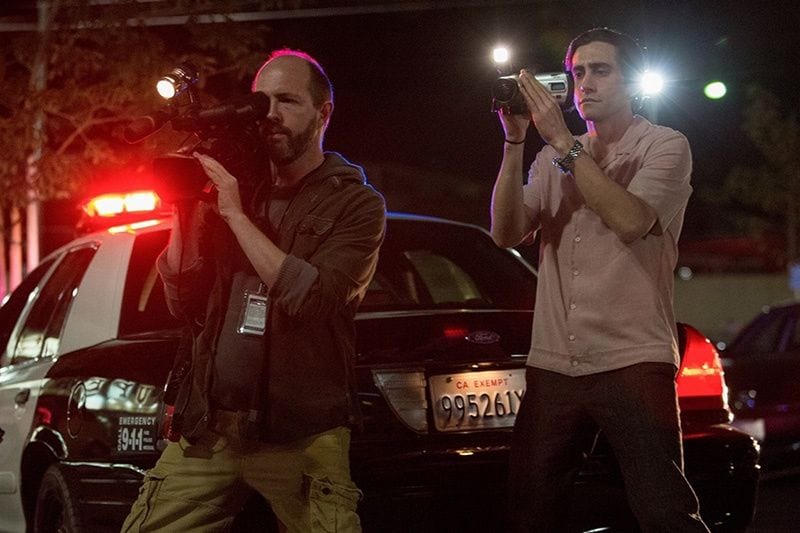Close your eyes for a moment and try to envision your favorite brand in human form.
That may sound like a completely loony request but trust me when I say that it’s not. Brands are everywhere. They exert a disquietingly outsized influence on our lives, and it seems as if every other person you meet these days is trying to cultivate a personal one. Branding is the “ubiquitous organizing principle” for much of contemporary society, as Amanda Hess noted last May in The New York Times Magazine, and branding is nothing more than the attribution of personality traits to non-human enterprises. So if you extend the process of branding past its logical endpoint and transform it into a quasi-science fiction hypothetical, you reach a point where there’s nothing left to do but try to imagine a brand incarnate.
Whenever I do this, whenever I try to visualize what a brand would look and act like if it were to assume bodily form, I always end up picturing Lou Bloom.
Lou Bloom is the main character of Dan Gilroy’s Nightcrawler, a satirical thriller that’s ostensibly about the degrading and sensationalist nature of local television news. Lou, played by Jake Gyllenhaal, is a freelance videographer who sells repugnant footage of car wrecks, fires, and crime scenes to Nina Romina (Renee Russo), a news director at a struggling local network in Los Angeles. Nina knows her program is desperate for a ratings boost, so she’s willing to breach the ethical boundaries that govern responsible journalism in turn for a larger viewership. She airs Lou’s grotesque images of bodies and car crashes, either not realizing or not caring that Lou himself has played an active role in precipitating many of the events he captures on video, and the program thrives, providing her with job security and opening the door for Lou and the company he founds, Video Production News, to become an indispensable supplier of daily content.
When Nightcrawler was released in the fall of 2014, many critics interpreted it as a searing indictment of local media outlets affinity for the “if it bleeds, it leads” approach to editorial strategy. Joe Williams of the St. Louis Post-Dispatch called it “an alternative version of Network,” still the gold standard for media satire, and Vulture‘s David Edelstein wrote that it “functions as a macabre media satire.” The film’s portrayal of local news stations as cesspools of unethical behavior and unflinching acquiescence to the lowest common denominator of audience demand is thoroughly compelling, though somewhat farfetched. As Slate film critic Dana Stevens argued in her review, there was no reason at the time of the film’s release to believe local TV news stations were “conducting daily bidding wars over the goriest footage random freelancers can bring them at the last moment.” The sort of footage Lou peddles to Nina and her colleagues would, even back in 2014, more likely have made the rounds on YouTube and Twitter long before airing on the morning broadcast. The crux of Nightcrawler‘s narrative felt dated upon arrival.
Perhaps this is why the far more compelling, and still absolutely germane aspect of the film is the character of Lou. As played by Gyllenhaal, Lou never seems like a real person. He comes across as a brand in the flesh, a living, breathing corporate enterprise with a set of clearly defined guiding principles and an endless reserve of sterile business lingo in lieu of a soul and a personality.
When I try to visualize a brand as a human, I see a person with bright, cloying eyes and a superficially upbeat demeanor, someone who’s always willing to lean into a handshake with a bit too much gusto and hold eye contact a little longer than normal. I imagine a one-sided conversation in which the brand-person talks in a tone that’s resolutely peppy and borderline aggressive; s/he takes simple, commonplace words and arranges them into a series of insipid phrases, always revisiting these phrases right up to the point where they would become unbearably annoying. There’s a sense of cheerful desperation lying just beyond the brand-person’s eyes, and our entire interaction seems to be predicated on the desire to complete some sort of transaction.
This is Lou Bloom in a nutshell. Nightcrawler opens with Lou stealing metal from a construction site and trying to hawk it at a nearby scrap yard. Before he even opens his mouth, the viewer is tempted to peg him as just another petty grifter. But when he does speak for the first time, Lou comes across like a wannabe Harvard business school student. When the foreman at the yard tries to lowball his offerings, Lou politely but firmly says “that’s below market value” before quickly countering with “I’m willing to take less to establish a business relationship.” He continues: “I’m looking for a job. In fact, I’ve made up my mind to find a career. I’m a hard worker, I set high goals, and I’ve been told that I’m persistent.” The juxtaposition of the pettiest larceny with blatant corporate doublespeak is disorienting, but Lou delivers this monologue with wide eyes, total confidence, and solid posture. He doesn’t betray any negative emotions when the foreman rejects his job solicitation, but instead stolidly smiles and walks away, almost as if he believes he’s just made a new business contact he might revisit in the future.

Lou eventually meets a veteran freelance videographer, or stringer as they’re referred to in the news business, played by Bill Paxton, and quickly realizes this is a market he might thrive in. So he pawns a stolen bike for a handheld video camera and seeks to get his foot in the door. Lou’s business relationship with Nina starts when he comes to her station and presents footage he shot of a fatal carjacking. They then have a conversation, during which Lou explains how he took an online business class the year prior and gleaned a set of simple ideas—like the importance of business plans and the need to consider how best to apply one’s talents—that continue to guide his actions.
Nina doesn’t seem to know what to make of the person who’s speaking as if he’s a garden variety business book come to life. But the clarity of Lou’s ambitions and the earnestness of his presentation overpower her hesitancy over interacting with someone who’s undeniably strange, and she expresses an interest in seeing more footage from him.
Every interaction Lou has throughout the film unfolds in this manner, with Lou unleashing torrents of well-worn catchphrases and the sort of insipid ideas rarely found outside a white collar environment, all while trying to extract something he wants from the person he’s speaking with, whether it’s the sale of footage or the establishment of an ongoing business relationship. When Lou interviews a down on his luck local named Rick (Riz Ahmed) for an internship with his company, he talks like a model HR manager. When a fellow stringer offers to hire him, Lou responds by saying “working for myself is more in line with my skills and career goals.” As Vox‘s Todd VanderWeff noted in an article about the film, Lou is “a character who’s completely absorbed corporate doublespeak… he often talks purely in buzzwords.” His language evinces no personality and no interests outside of growing his business, and understanding his language is key to understanding his character.
This language makes clear that Lou Bloom is not a real person. He’s Lou Bloom™, a fully realized brand come to life. Even in the rare moments when Lou pursues interests not directly related to the growth of Video Production News, like a sexual relationship with Nina, he frames them as emotionless transactions to be obtained through conventional negotiation. As the film progresses, Lou realizes that in order to stay one step ahead of his competitors he must consistently present the goriest, most sensational footage. So he begins manipulating crime scenes, causing accidents, and facilitating situations where mayhem is likely to unfold in front of his camera.

There are no ethical boundaries restricting what he’s willing to do to further the interests of his business and his brand, but when Rick curses during a discussion about compensation, Lou takes great offense, saying “Do you know I’ve never once sworn in front of an employer?” This is the state of corporate America in a nutshell: brands and their leaders are willing to justify unbridled avarice through any means necessary but still demand individual workers adhere to trivial principles of corporate decorum no matter the situation.
In an act that is absolutely revolting and represents a coup for his burgeoning business, Lou allows Rick to be shot by a fleeing gunman before filming Rick dying on the street. He pauses the camera just long enough to explain his motivations, telling Rick “I can’t jeopardize my company’s success to retain an un-trustworthy employee,” a reference back to the aforementioned salary negotiation. For Lou Bloom™, everything comes back to the health of his business and the perception of his brand. He is a corporate enterprise in human form, and his personality is the brand of that enterprise
The character of Lou is what makes Nightcrawler a classic film of the post-Great Recession era. Gyllenhaal’s performance as Lou, a brand in the form of a person, addresses one of the most omnipresent issues of our time: people’s propensity to present themselves as frictionless brands rather than messy human beings. It’s been over 20 years since management “guru” Tom Peters first urged people via a predictably vapid Fast Company article to think of themselves as individual brands. That advice seems to have finally taken hold with a critical mass of Americans, and this has dire consequences for the health of American society.
Donald Trump built a career on using his personal brand to divert attention away from his remarkable shortcomings as a businessman; he then rode the strength of that brand all the way to the presidency. People join social media networks, it seems, so that they can constantly promote themselves and communicate in the sort of tone that suggests they view life as nothing more than one giant corporate networking event.
As writer Tony Tulathiumutte noted a few years ago in an article published in The New Yorker, the rise of personal branding calls to mind Jean Baudrillard’s crisis of meaning, which, according to Tulathiumutte occurs when “perfect simulations end up displacing whatever they simulate.” But as Nightcrawler suggests, the personal branding phenomenon is just as much a crisis of humanity, because transforming oneself into a brand requires a person to strip themselves of any human qualities that might stand in the way of self-promotion and bottom line growth. A brand has one directive: grow the business at any cost. And so engaging in behaviors that treat life as nothing more than a series of transactions becomes an intolerable distraction for the person as brand.
In Nightcrawler, the simulated brand of Lou Bloom™ takes precedence over any strains of human nature that may have once existed inside of this person, and Lou’s immoral behavior and creepy self-presentation are manifestations of his brand’s impulse to always-be-selling. As such, Nightcrawler offers a slightly absurdist extrapolation on the consequences of personal branding, one that is at once shocking and immensely fun to watch. Not every person who constructs a personal brand is going to automatically transform into an immoral psychopath like Lou Bloom™. But no other film released in recent memory does a better job of indirectly portraying and satirizing the unfortunate ramifications of this newly popular social practice.
This is what makes Nightcrawler one of the indispensable films of the past decade. After all, the US justice system has gone to great lengths to create a legal landscape where corporations can self-identify as people. Nightcrawler offers a shocking glimpse of what it looks like when a person transforms into a corporation.

